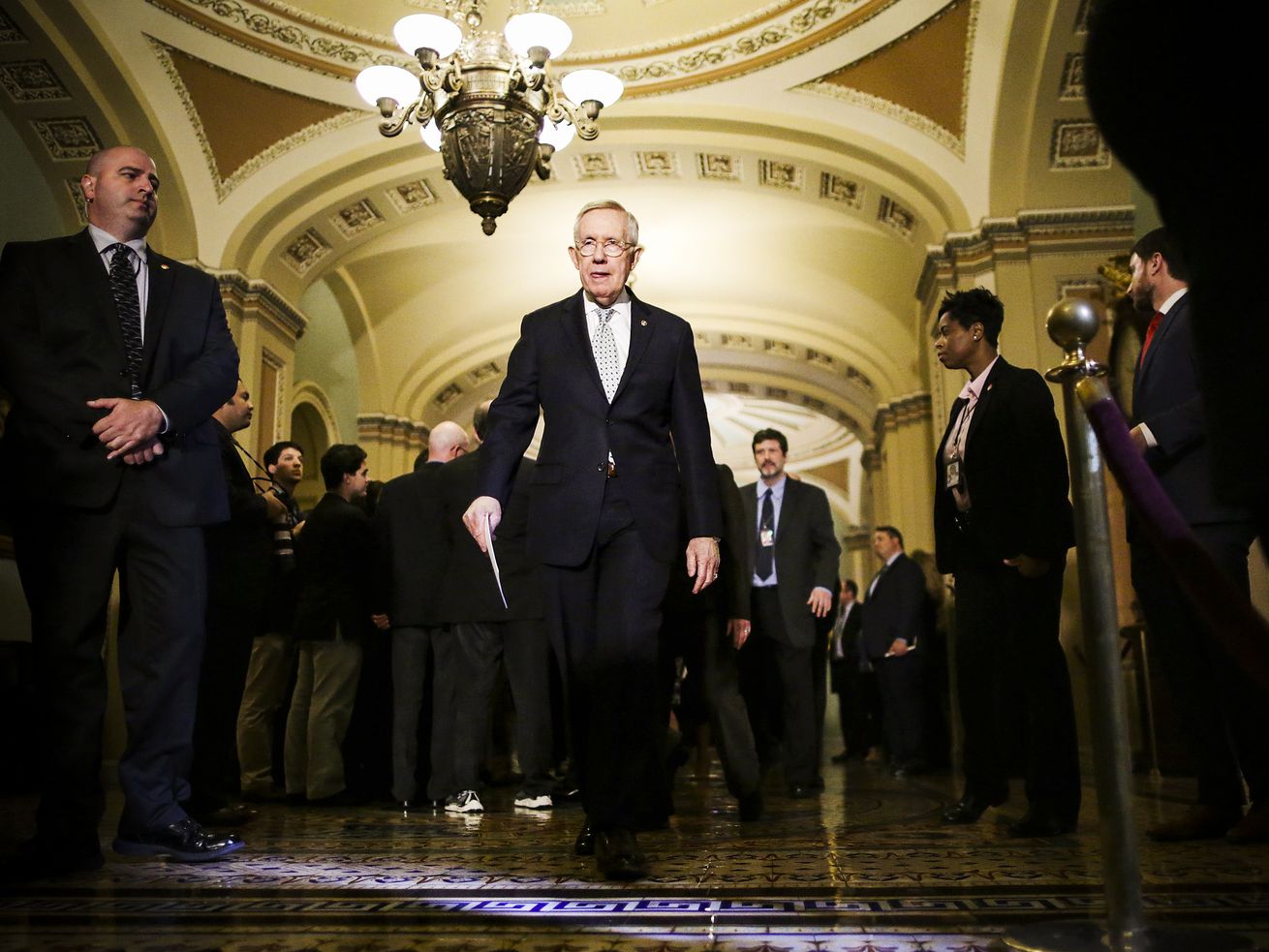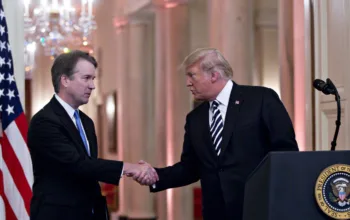The former Senate majority leader, who died this week at 82, was a forward-thinking political strategist who played to win.
Harry Reid, the former Senate majority leader who distinguished himself as one of the Obama-era Democratic Party’s premier political strategists, died Tuesday at the age of 82.
Reid, who had pancreatic cancer, led an uncommonly colorful life for a United States senator. But despite his vast power and influence, he was never a high-profile public figure. Reid wasn’t known for his stump speeches, was a relatively rare presence on national television, and, despite his occasionally pungent language, wasn’t a go-to source of quips on Capitol Hill, either.
But perhaps more than any other Democrat of the 21st century, he took a clear-eyed view of the structural transformations of American politics and believed in accepting the world as it was while fighting hard and playing to win.
/cdn.vox-cdn.com/uploads/chorus_asset/file/13663843/GettyImages_175084346.jpg) Mandel Ngan/AFP/Getty Images
Mandel Ngan/AFP/Getty ImagesLike most successful legislative leaders, Reid was more of an organizer and a consensus-builder than a policy visionary. But unlike his Republican counterpart Mitch McConnell, he leaves a substantive legacy of positive achievements rather than tactical blocking moves.
And in his home state of Nevada, he’s known as the architect and maestro of what’s probably the contemporary Democratic Party’s most successful exercise in party-building. Early in his Senate career, Reid was a moderate representing a mostly Republican state. By its end, he was a solidly progressive senator from a blueish state and the leader of a “Reid Machine” whose record of political successes outlasted him and now has locked down state offices up and down the board.
A colorful life
Reid grew up poor in the Depression-era mining community of Searchlight, Nevada.
His parents lived in a small shack with no hot water or telephone, and he had to go stay with relatives 40 miles away in Henderson to attend high school because there wasn’t one in Searchlight. He went to Utah State University, where he was a boxer, met his wife, and converted to Mormonism, before moving to Washington, DC, where he attended law school while working as an officer with the US Capitol Police to support his family. After moving back to Nevada, he quickly entered the state legislature; after a single term he became the state’s youngest-ever lieutenant governor at the age of 30.
That led to a failed US Senate run in 1974, followed by a failed run for mayor of Las Vegas in 1975. But two years later, he scored an appointment as chair of the Nevada Gaming Commission that helped revive his political career. In 1978, he was offered a bribe by a man named Jack Gordon. Reid reported the attempted bribery to the FBI. They set up a sting, but Reid ended up going off-script and choking the criminal as he was about to be arrested.
”You son of a bitch, you tried to bribe me!” Reid said.
/cdn.vox-cdn.com/uploads/chorus_asset/file/13668263/GettyImages_674220540.jpg) Laura Patterson/CQ Roll Call via Getty Images
Laura Patterson/CQ Roll Call via Getty ImagesLater, in 1981 a car bomb was found in Reid’s family car. The culprit has never been identified, but there has long been speculation that it was related to Gordon or other organized crime figures Reid tangled with as gaming commissioner.
In 1982, Nevada went from having one House district to two, and Reid was able to win the Democratic nomination to represent the newly drawn Democratic-leaning district centered on Las Vegas. After two terms back on Capitol Hill — this time as a Congress member rather than a cop — he ran for Senate and won in a national Democratic sweep in 1986. There, he established a mostly low-key presence as a moderate Democrat until emerging as a Democratic leader in the mid-aughts.
An unlikely progressive champion
Reid took the reins of a battered Democratic Senate caucus in January 2005 after his predecessor, Tom Daschle, lost his reelection bid. Democrats lost four seats on net in the 2004 cycle, and George W. Bush was reelected as president with the only GOP popular vote victory between 1988 and today.
Even as Republicans were beating them at the polls, Senate Democrats had roused the fury of progressive activists by spending Bush’s first term striking a largely accommodationist posture. It’s difficult to imagine in today’s era of hyperpartisanship and routine filibustering, but Bush’s 2001 tax cuts passed with 12 Democratic votes, and even the 2003 sequel was supported by two Democratic senators.
The 2002 vote authorizing the use of military force in Iraq had, of course, been supported by many Democrats, including then-Majority Leader Daschle. And in 2003, not only did two Democratic senators join most Republicans to back a Medicare reform plan, the Democratic caucus simply opted not to filibuster the bill even though they had the votes to block it.
For Democrats eager to see a rebirth of fighting spirit, Reid seemed like an unlikely champion.
/cdn.vox-cdn.com/uploads/chorus_asset/file/13668280/GettyImages_1164529.jpg) Alex Wong/Getty Images
Alex Wong/Getty Images“Reid is a Mormon, and differs with most of his Democratic colleagues on social issues,” Elsa Walsh reported for the New Yorker in 2005. “He is opposed to abortion, gay marriage, and gun control, and supports the death penalty.”
But placed in the leader’s chair, Reid swiftly proved to be a gritty, effective fighter. His political team was one of the first to try to actively court online “netroots” activists, and he joined with Nancy Pelosi in the House to craft a strategy of root-and-branch opposition to Bush’s plan to privatize Social Security.
All Social Security legislation is subject to filibuster, so if Senate Democrats held together in opposition, nothing could pass. This made House Republicans gun-shy about taking unpopular votes on bills that would be DOA in the Senate, which eventually led to the entire privatization effort collapsing in a burst of infighting with no actual bills ever voted on in either house of the legislature.
/cdn.vox-cdn.com/uploads/chorus_asset/file/13668306/GettyImages_56616061.jpg) Chip Somodevilla/Getty Images
Chip Somodevilla/Getty ImagesReid quietly encouraged Barack Obama to challenge Hillary Clinton in the 2008 primary, calculating both that Clinton was likely to be a relatively weak election performer and that a charismatic African American who’d voted against the Iraq War was perfectly positioned to take down a daunting frontrunner.
He spearheaded Obama’s first-term legislative efforts, somehow along the way stopped being pro-gun rights and anti-abortion, and distinguished himself as a down-and-dirty street fighter in a legislative body traditionally known to prize decorum and tradition.
Mastering the Senate
Reid, along with his GOP counterpart Mitch McConnell, presided over a dramatic shift in Senate norms during a period where the partisan polarization that characterizes American society writ large came with full force into a legislative body whose rules really weren’t designed to accommodate it.
The decision to simply pre-commit to filibustering a Social Security bill rather than use the potential of a filibuster as leverage to start a negotiating process was unexpected at the time. And deeper into 2005, Reid-led Democrats took the then-unprecedented step of filibustering some of the Bush administration’s most extreme judicial nominees.
/cdn.vox-cdn.com/uploads/chorus_asset/file/13668328/GettyImages_99295207.jpg) Chris Maddaloni/Roll Call/Getty Images
Chris Maddaloni/Roll Call/Getty ImagesRepublicans, outraged by this use of obstruction tactics, threatened to change the rules of the Senate to prevent judicial filibusters. Some of us argued at the time that Democrats should take the opportunity to make a high-minded deal to eliminate filibusters altogether, but instead a compromise was reached in which the filibuster remained, a couple of Bush’s nominees were withdrawn, and Democrats implicitly agreed to be sparing with blocks of future nominees.
Then, after Democrats swept into the majority in the 2006 midterms, Republicans began routinely filibustering every piece of legislation, making it tough for Democrats to pass popular message bills that Bush would veto. And early in 2009, McConnell made it clear that no piece of legislation, no matter how pressing, was going to move forward without 60 votes. Reid responded to this by routinely deploying a previously rare legislative tactic known as “filling the tree” (don’t ask) to curtail senators’ ability to offer amendments to legislation.
The upshot of this tit-for-tat was to turn the Senate into a House-like, leadership-driven body that isn’t much fun for back-bench members but that also featured a supermajority requirement for getting things done.
/cdn.vox-cdn.com/uploads/chorus_asset/file/13668343/GettyImages_162798237.jpg) Tom Williams/CQ Roll Call
Tom Williams/CQ Roll CallThat in turn came under pressure in 2013 when McConnell began not just filibustering particular nominees but blocking any appointment to fill certain key offices. His hope was to deny the National Labor Relations Board a quorum it needed to conduct business, prevent the newly created Consumer Financial Protection Bureau from operating, and prevent Obama from installing a Democratic majority on the DC Circuit Court.
Reid responded to this by changing the rules to bar filibusters of presidential appointees — the very change that’s made Donald Trump such a potent judge-appointer — which many have suggested was perhaps a mistake on Reid’s part, but for which he made no apologies.
The Senate leader who cried wolf
Apologizing was really not Reid’s thing in general.
Back in the pre-Trump days, when politicians were typically expected to at least pretend to be nice to each other, he flatly called Bush a “liar” (and said his dog was fat), referred to Alan Greenspan as a “political hack,” and brusquely confessed, “I can’t stand John McCain.”
And in a noteworthy turn of the 2012 campaign, he claimed to have sources (intimated to have been obtained through his connections to the Church of Jesus Christ of Latter-day Saints) who knew that Mitt Romney had paid no income tax for the past several years. This successfully baited Romney into releasing his actual tax returns, which showed that Reid was wrong, but also illustrated that Romney, as a rich guy able to take advantage of tax preferences for investment income, paid a lower marginal rate than many middle-class people.
Asked later by CNN if he had any regrets about this, Reid replied, “Romney didn’t win, did he?”
/cdn.vox-cdn.com/uploads/chorus_asset/file/13668371/GettyImages_512259226.jpg) Jim Watson/AFP/Getty Images
Jim Watson/AFP/Getty ImagesJust a short time after that interview, however, the 2016 presidential campaign was upended by then-FBI director James Comey’s decision to announce that new emails relevant to the Hillary Clinton server investigation had been discovered on Anthony Weiner’s laptop. These turned out not to be new emails at all, just additional copies of the same emails that had already been reviewed.
Reid attempted to push back on the ensuing media email frenzy with a sternly worded letter that accused Comey of sitting on “explosive information” about Trump and Russia.
In retrospect, Reid was correct about this. The FBI had an ongoing counterintelligence investigation into the Trump campaign — information that was clearly more relevant to the campaign than the discovery of new copies of old emails. Had Comey released that information at the time Reid demanded, it’s easy to imagine that Clinton would have won.
But at the time, Reid had a reputation as a guy who made a false statement about a previous GOP presidential candidate to try to win an election, so he wasn’t taken as seriously as, in retrospect, he should have been. It made for a sour endgame for what was overall a very successful career as a party leader.
The “Reid machine”
When Reid retired at the end of 2016, Democrats did not have a great year politically.
One place they did have a good year, however, was Nevada, where Reid’s handpicked successor, Catherine Cortez Masto, won his Senate seat. Her opponent, then-Rep. Joe Heck, vacated a House seat to run against her, and Reid recruited a little-known computer programmer named Jacky Rosen to run for the newly open seat. She won and then two years later beat incumbent Republican Sen. Dean Heller to complete an extraordinarily rapid political ascension.
/cdn.vox-cdn.com/uploads/chorus_asset/file/13668431/GettyImages_628757096.jpg) Tom Williams/CQ Roll Call
Tom Williams/CQ Roll CallDemocrats also flipped both houses of the Nevada state legislature in 2016. Two years later, Clark County Commissioner Steve Sisolak (Reid’s choice for the nomination, naturally) was elected governor as part of a near-sweep of statewide offices that also saw Democrats take over as lieutenant governor, attorney general, state treasurer, and controller.
The refashioning of Nevada into a blue state has a fair amount to do with demographic changes. But it’s also a considerable organizing achievement that has largely been a partnership between Reid and the Vegas-based Culinary Union, which represents workers at many of the city’s hotels, restaurants, and casinos. The Culinary’s very existence is an organizing triumph as a rare private sector labor union to successfully organize workplaces and grow membership in a right-to-work state.
Details vary from place to place, but the party Reid built in partnership with his state’s Latino community and its largest union (many of whose members are, of course, Latino) is in many ways an important template for the overall trajectory of the Democratic Party — grounded in voters of color and union organizing, and relying on appeals to bread-and-butter economic issues without tilting either to socialism or vacuous “wokeness.”
The deaths of George H.W. Bush and John McCain in recent years reminded Americans mostly of bygone styles and political eras.
Reid, on the other hand, was very much a man of his times, but also a forward-thinking political strategist whose legacy has more to offer as a vision of the future than as merely a nostalgic reminder of the past.
/cdn.vox-cdn.com/uploads/chorus_asset/file/13668442/GettyImages_674220554.jpg) Laura Patterson/CQ Roll Call via Getty Images
Laura Patterson/CQ Roll Call via Getty ImagesMatthew Yglesias is a cofounder of Vox.com and the founder of Slow Boring.
Author: Matthew Yglesias
Read More



